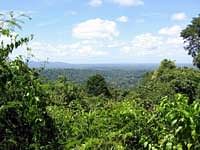A new way to reap benefits from tropical forests!

A team, led by International Institute for Environment and Development, has said that the communities in Orissa have now increased 'access rights' to collect and manage non-timber forest products in state forest land.
The project also involves forest community groups and policymakers across ten countries in Africa and Asia.
"With forests set to take centre stage in a new global deal to tackle climate change, there is a desperate search underway for proven ways to improve governance to ensure that forest resources are managed for the public good.
"That search should look at what's been achieved by the Forest Governance Learning Group (FGLG). Its experience shows how to improve governance in ways that lead to tangible changes in policy with positive impacts on people who depend on forests," team leader James Mayers said.
Through stimulating, the project has achieved impacts such as -- forest-dependent households living around Uganda's Mabira forest have more secure livelihoods after action which reversed a government decision to degazette the forest and convert it to sugar plantations.
Moreover, actions like improved governance frameworks in Vietnam have enabled practical actions for local beneficial community forestry.
According to the researchers, several investments in logging deals that were over-exploitative of local forests and livelihoods have been questioned and prevented by high-level action in Mozambique.
To assess the work's impact so far and what can be learned from it, IIED commissioned an independent evaluation by Tom Blomley of Acacia Consulting.
"Strong examples of this come from Ghana, South Africa and Indonesia where important policy changes have been effected as a direct result of the work of the learning groups in those countries," the report says.
The report notes that the level of impact generated in terms of learning, as well as improved governance, is high despite the project's modest cost. "The decentralised manner in which FGLG has worked across the ten countries has provided an important testing ground for innovative approaches."
Mayers said: "Many forest problems are questions of social justice. Where FGLG country teams are working well they have shown how practical steps to greater social justice and sustainable local livelihoods can be taken even when very powerful players are up against them.
"This provides strong lessons for efforts to support forest governance as a climate change mitigation strategy -- Reduced Emissions from Deforestation and Degradation."
Deccan Herald is on WhatsApp Channels| Join now for Breaking News & Editor's Picks